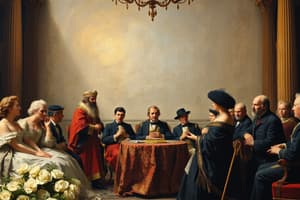Podcast
Questions and Answers
What is the primary legal position of the monarch in the political system?
What is the primary legal position of the monarch in the political system?
- Head of the executive and judiciary (correct)
- Head of the legislative assembly
- Supreme military commander
- Leader of international relations
Since what year has the monarch's approval to a bill (royal assent) not been denied?
Since what year has the monarch's approval to a bill (royal assent) not been denied?
- 1801
- 1708 (correct)
- 1689
- 1901
Who primarily advises the monarch on political matters according to the political practice?
Who primarily advises the monarch on political matters according to the political practice?
- The judiciary
- The Parliament
- The Prime Minister (correct)
- The Cabinet
Which statement best describes the role of the monarch in the context of the constitutional theory since 1689?
Which statement best describes the role of the monarch in the context of the constitutional theory since 1689?
What is the Queen's Speech primarily intended to convey?
What is the Queen's Speech primarily intended to convey?
What is one of the main functions of the monarch regarding the government?
What is one of the main functions of the monarch regarding the government?
How does the monarch contribute to national stability?
How does the monarch contribute to national stability?
What role does the monarch play in representing Britain abroad?
What role does the monarch play in representing Britain abroad?
How often does the Queen consult with her Prime Minister?
How often does the Queen consult with her Prime Minister?
What is a key characteristic of the monarch's political stance?
What is a key characteristic of the monarch's political stance?
Flashcards
Monarch's Legal Powers
Monarch's Legal Powers
The monarch holds the legal right to make decisions about the government, justice system, military, and Church of England.
Monarch's Political Practice
Monarch's Political Practice
In reality, the monarch's powers are limited by the constitutional theory. The Prime Minister advises the monarch and effectively makes most decisions.
Prime Minister's Influence
Prime Minister's Influence
The Prime Minister advises the monarch on decisions regarding government appointments, declaring war, dissolving Parliament, and more. The monarch essentially follows their advice.
Royal Assent
Royal Assent
Signup and view all the flashcards
The Queen's Speech
The Queen's Speech
Signup and view all the flashcards
Monarch as a Symbol of Unity
Monarch as a Symbol of Unity
Signup and view all the flashcards
Monarch's Stability
Monarch's Stability
Signup and view all the flashcards
Monarch 'Above Politics'
Monarch 'Above Politics'
Signup and view all the flashcards
Monarch's Practical Role
Monarch's Practical Role
Signup and view all the flashcards
Monarch's Role in a Crisis
Monarch's Role in a Crisis
Signup and view all the flashcards
Study Notes
Monarch's Political Role: Theory vs. Practice
-
Theoretical Powers: The monarch is the head of the executive, judiciary, and Church of England. They are also commander-in-chief and head of state for the Commonwealth and 16 other countries. The monarch appoints cabinet members, summons and dissolves Parliament, and signs bills into law.
-
Limited Powers in Practice: Since 1689, monarch's powers are largely limited by constitutional theory. The monarch's actions are guided by the Prime Minister's advice. The Prime Minister advises on appointments, war declarations, peace treaties, and Parliament's sessions.
-
Formal Functions & Approvals: The Prime Minister writes the Queen's Speech. The monarch has automatically approved every law since 1708. Formal functions, such as granting honours or pardons, are directed by the government.
-
Symbolic Role: The monarch symbolizes national unity and government stability.
-
Consultation and Representation: The monarch is frequently briefed on national affairs. Receives a daily summary of important documents. Consults with the Prime Minister weekly. Visits foreign countries to represent Britain and meet other heads of state.
-
Potential Role in Crisis: In extraordinary circumstances, like a government threatening democracy, the monarch's power of royal assent could be used to block bad laws.
Studying That Suits You
Use AI to generate personalized quizzes and flashcards to suit your learning preferences.




